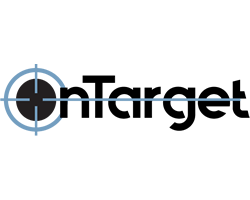- Targeted Therapies
- Scientific Committee & Collaborators
- History
- Endorsement
- Disclosure of potential conflict of interest
- Other Resources
- Acknowledgements
Overview of Targeted Therapies
A number of therapies in oncology target specific molecules and receptors that are involved in the development, growth, and progression of cancer in thriving human cells. Human cells receive and transmit vital information from their environment along biochemical signaling pathways. Cell surface receptors receive signals from the extracellular environment and transmit them into cells, activating a chain of signaling molecules, often called second messengers, which are aligned along specific pathways to the cell nucleus. These signals influence cellular:
- Growth
- Differentiation
- Reproduction
- Survival
A signaling pathway is triggered when a ligand binds to the extracellular portion of cell surface receptors. The ligand may be a growth factor, hormone, antibody, or other biochemical. The ligand activates the receptor, leading to signal transduction within the cell. Signaling molecules then transmit messages to a chain or pathway of other signaling molecules to the nucleus.
How targeted therapies work
Targeted therapies in oncology attack molecular targets on cell signaling pathways. The most typical targets are:
- Ligands that bind to and activate cell surface receptors
- Cell surface receptors
- Intracellular signaling molecules
- Transcription factors in the nucleus
Monoclonal antibodies (MAb) generally work outside the cell. They target ligands that bind to cell surface receptors or the extracellular portion of cell surface receptors. Small molecule drugs generally work inside the cell. They target the intracellular portion of cell surface receptors, signaling molecules that relay messages through the cell or transcription factors within the cell nucleus.
The molecular targets of newer biologic therapies have been implicated in the development and progression of cancer. Many are overabundant, dysregulated, or abnormal in cancer cells. By targeting these disrupted molecules, targeted therapies attack the mechanisms that lead to tumor formation and progression. However, they may also impact molecular targets in normal cells, leading to particular adverse events.
Common adverse events profiles
The common adverse-event profiles of these agents differ from those of traditional chemotherapeutic agents and hormonal agents. However, these common adverse events are often predictable, based on the specific mechanism of action and molecular target of each agent.
Early identification of common adverse events and timely intervention may ameliorate some common adverse events and encourage patient adherence to targeted therapy, which may improve patient survival and quality of life.
Scientific Committee & Collaborators
A committee of practicing oncology pharmacists in conjunction with an expert review panel and in collaboration with the Groupe d'étude en oncologie du Québec developed this resource program.
Scientific Committee

Marie-Pascale Guay
B. Pharm., M.Sc., BCOP
(Committee Chair)
Pharmacist, CIUSSS de l'Estrie – CHUS (since 2025)
Pharmacist, Coordinator of the Oncology Pharmacy, Jewish General Hospital, CIUSSS Centre Ouest de l’île de Montréal (2006–2025)
Scientific Committee Member and President since 2009

Nathalie Letarte
Pharm. D., M.Sc., DESG, Pharm. D., BCOP
Pharmacist, CHUM (Centre hospitalier de l’Université de Montréal).
Clinical Professor, Faculty of Pharmacy,
University of Montreal.
Co-chair of the Chaire Famille Sabourin en santé des femmes, Montreal, QC
Scientific Committee Member since 2018

Jean-Philippe Adam
B. Pharm., M.Sc., BCPS, BCOP
Pharmacist, CHUM (Centre hospitalier de l’Université de Montréal).
Associate Chief Pharmacist, pharmaceutical care, Montreal, QC
Scientific Committee Member since 2018

Annie Brisebois-Boyer
Pharm. D., M.Sc., BCOP
Pharmacist, Maisonneuve-Rosemont Hospital, CIUSSS de l'Est de l'île de Montréal
Scientific Committee Member since 2022

Myriam Fréchette-Le Bel
Pharm. D., M.Sc.
Pharmacist, CHUS (Centre hospitalier universitaire de Sherbrooke)
Scientific Committee Member since 2025

Pierre Lemieux
B.Pharm. M.Sc., BCOP
Pharmacist, CIUSSS de la Mauricie-et-du-Centre-du-Québec, Trois-Rivières, QC
Scientific Committee Member from 2021 to 2024
Scientific Reviewers
Bianca Déry-Neveu, B. Pharm., M.Sc., DESS in public health
Pharmacist and coordinator in oncology
Centre intégré de santé et de services sociaux de la Montérégie-Est
Monica Khauv, B.Pharm., M.Sc in hospital pharmacy, BCOP
Pharmacist at Centre intégré universitaire de santé et services sociaux de l'Ouest-de-l'Île-de-Montréal
Project Development and Implementation Team
Marie-Josée Bélanger - Project Manager
Patricia Jaroslawski, Athena Kalyvas, Katherine Halievski - Medical Writers
François Brouillet, Matthew Brouillet - Web conception and programming
Caroline Chabot - Graphic design
Élise Parent (in memoriam) - Translation
Denise Bérubé - Translation
Care has been taken to ensure the accuracy of the information; however, it is not intended to provide a complete description of all adverse events or to be used as a replacement for the product monographs of the targeted therapies that are discussed here. Since information on these therapies is constantly evolving, it is advisable not to use this program as the sole source of information on this subject. You are encouraged to consult other sources of information as they become available. Use this document and any information in it at your own risk. Use of this material is subject to our Terms of Use.
The information in this document is provided solely as an educational service. Specific patient care decisions are the responsibility of the clinician who cares for the patient on a targeted oncology therapy.
History
The committee wishes to recognize the pivotal contribution and outstanding commitment of Lucie Surprenant and Suzanne Frenette in the initial and ongoing development of the OnTarget project. Ms. Surprenant was the initiator of the project and the chair of the scientific committee for the first two versions of the program. Mrs. Frenette was a member of the scientific committee for the first 3 versions of the program.
The committee would also like to thank the experts who contributed to the review or the chapters over the last few years.
- Thomas Joly-Mischlich, B. Pharm. M.Sc.
Oncology Pharmacist at the CIUSSS de l'Estrie – CHUS - Victoria Kletas, B. Pharm., M.Sc.
Oncology Drug Information Specialist, BC CANCER - Isabelle Savoie, B. Pharm., M.Sc.
Oncology Pharmacist, Verdun Hospital
Approval
 The resource guide is endorsed by the Groupe d'étude en oncologie du Québec (GEOQ) 2026.
The resource guide is endorsed by the Groupe d'étude en oncologie du Québec (GEOQ) 2026.
Disclosure of potential conflict of interest
Industry involvement included the funding of honoraria for the independent oncology pharmacist scientific committee and all expert reviewers, who received honoraria in recognition of their time and expertise in the subject matter. The funds were also used to pay the project management, medical writing, programming and hosting the website, translation and accreditation fees.
Scientific Committee Disclosures
Marie-Pascale Guay, B. Pharm., M.Sc., BCOP
Oncology Pharmacist, Oncology Pharmacy Coordinator , Jewish General Hospital, Montreal, QC (Committee Chair)
Disclosures: Marie-Pascale Guay has no real or potential conflict of interest to disclose.
Nathalie Letarte, Pharm. D., M.Sc., DESG, BCOP
Clinical assistant professor, Faculty of Pharmacy, University of Montreal, and pharmacist, CHUM; Co-chair of the Chaire Famille Sabourin en santé des femmes, Montreal, QC
Disclosures: Nathalie Letarte has received honoraria from Astra-Zeneca for acting as a speaker for a presentation to pharmacists.
Jean-Philippe Adam, B. Pharm., M.Sc., BCPS, BCOP
Oncology Pharmacist, CHUM, Montreal, QC
Disclosures: Jean-Philippe Adam is a member of the following commercial advisory boards: Abbvie, Gilead Canada, Janssen, Lundbeck and Takeda Canada. He is a paid speaker for Abbvie, Amgen, Celgene, Janssen and Novartis.
Annie Brisebois-Boyer, Pharm. D., M.Sc., BCOP
Pharmacist, Hôpital Maisonneuve-Rosemont, QC
Disclosures: Annie Brisebois-Boyer has no real or potential conflict of interest to disclose.
Pierre Lemieux, B.Pharm. M.Sc., BCOP
Pharmacist at the CIUSSS de la Mauricie-et-du-Centre-du-Québec, QC
Disclosures: Pierre Lemieux is an advisor for the scientific consults of the companies Apologix and Sandoz. He is a paid speaker for Janssen.
Acknowledgements
The Groupe d'étude en oncologie du Québec (GEOQ) is a non-profit online organization dedicated to promoting communication and cooperation between professionals who are involved in the diagnosis, investigation, and research of treatments for different types of cancer and associated hematological conditions.
The Web site www.geoq.info provides up-to-date oncology information to healthcare professionals in Quebec.
The scientific committee and expert review committee who developed this Resource Guide would like to thank GEOQ for hosting this program and providing expertise along the way during the design and development phase.
Other Resources
The OnTarget group recognizes the great contribution of other available resources which serve to support pharmacists in the management of cancer patients.
Other useful resources include:
www.geoq.infowww.inesss.qc.ca


